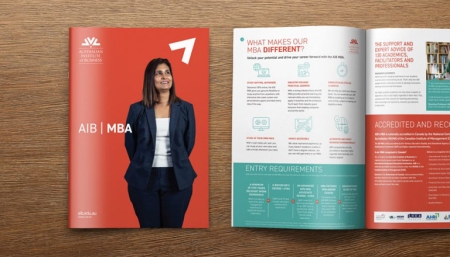The increasing demand for MBAs in the health sector

As the health industry’s demand for MBA graduates continues to rise, the Australian Institute of Business (AIB) investigates the degree’s increasing popularity with health practitioners and managers worldwide. Three key themes emerged from the research, including the growing demand for MBA degrees in health, the advantages the degree is providing the industry, and how those working in healthcare are today overcoming the time commitments required to study an MBA while working full-time.
1. Healthcare’s demand for MBAs is on the rise
Thanks to an aging population, the healthcare industry is booming, and with it has come a rising need for competent managers to make the tough decisions at the top tiers of businesses. Faced with the challenge of controlling business costs while continuing to provide high-quality care, many healthcare providers are today looking at business degrees to give them the necessary skills to support them in leadership positions. Recruiters are also responding to this trend, with big brands such as Johnson & Johnson reporting a 20% in recruitment of MBAs and undergraduates in 2014.
As most health practitioners are hired for their years of technical experience, those working in the industry are recognising that completing an MBA can give them an edge over competitors and help prepare them for management positions. Not only can the MBA help formalise management lessons learnt through experience, but by its very nature the degree provides graduates with an overarching view of business and a useful framework for senior staff to make strategic decisions.
2008 MBA graduate Simon Boag completed the AIB MBA to gain technical skills on top of his previous experience. Now the CEO of Benson Radiology, he continues to use the skills from his MBA on a daily basis.
“I come from a technical background, and I found that although I had quite a lot of experience in management, I didn’t have the framework and the structure behind the decisions I was making – and that is what I was seeking. Studying the MBA through AIB helped me achieve that,” he said.
Others in the healthcare industry have found that the greatest benefit of the MBA has been in helping them to manage challenges, not just in their current business, but also within their current industry – such was the case with Dr Jacky Tiang, a Pharmacy Manager who completed his AIB MBA in 2015.
“I used my MBA project to pick the right strategy for our pharmacy to remain competitive in today’s climate, and the result gave a clear-cut view of the strategy we should adopt,” Jacky said. “The major challenge that the community pharmacy industry is facing is that it’s mature and moving towards the declining stage, but my MBA provided me with a solid base to face that challenge. It confirmed our suspicions and proved that what we were doing was correct.”
MBAs can also help those without a business background to be better prepared for managerial positions later on in their career, gaining skills that translate directly into the boardroom, allowing them to make business decisions and communicate effectively with other managers.
2. MBAs open doors to areas not always accessible to health practitioners
Another reason for the MBA degree’s rising popularity with health providers is that it provides graduates with a host of skills and opportunities not otherwise open to them, teaching them how to think outside the box, and giving them the opportunity to learn from and interact with facilitators and students from both the public and private sector.
It’s no wonder that the healthcare sector’s demand for MBA graduates increased by 9 per cent in 2014 according to the QS 2014/15 TopMBA.com Jobs & Salary Trends report. While the report found that a host of ‘global players’ are dominating the field as active MBA recruiters, it also found many smaller pharmaceutical and healthcare companies are today aggressively pursuing MBA hiring to help them meet their growth potential. According to the report, the appeal of hiring MBA graduates lies in the competencies the degree gives to graduates, with healthcare employers saying MBA graduates’ communication, multitasking and teamwork abilities make them valuable.
For Karen Cole, a 2015 AIB MBA graduate and General Manager at Bupa Aged Care Australia, the MBA has given her skills her previous education didn’t provide.
“I have a masters in professional studies (nursing education) and I wanted a postgraduate qualification that was broader than just healthcare. Before my MBA I had a narrow, education-focused view, but now having completed the MBA, and particularly the leadership, marketing and finance subjects, I can solve daily problems from a more holistic view,” she said.
“Completing my MBA gave me another language to use – when I sit in meetings now I understand exactly what our executive director is saying and, with the confidence that the MBA has given me, I’m now more willing to speak up because I have a better understanding of the business and more credibility amongst senior staff.”
3. Time is the biggest challenge for health sector MBA students
Finding the time to complete an MBA without sacrificing the commitment required by full-time work is a challenge faced by many students. This is made even more difficult by those working in shifts or under an intensive workload, which is typical of the health sector. However, despite the time challenge required to fit the MBA into a busy workload and family life, many healthcare workers are managing to complete their degree by choosing a flexible programme with online course delivery.
2014 AIB graduate Linda Winn chose AIB for her MBA so she could complete the program within her own hours. As Deputy Director of the New South Wales Health Emergency Management Unit, she leads a team responsible for the prevention, preparedness, response and recovery of all major disasters across the state. With starting her working day at 5am and finishing at 7pm each weeknight, as well as a busy family schedule, a traditional classroom commitment just wouldn’t have worked for Linda.
“When you’re a busy professional working full-time, a mother and wife, having the flexibility to study when I wanted without the commitment of set lectures made completing the MBA so much easier for me.”
Now having completed the MBA, Linda’s work-applied qualification has given her the ability to apply each subject to her role and organisation, which is saving them both time and money.
“I focused my MBA project on succession planning, and we have applied the findings to our interview process, greatly improving it,” she said.
Learn how AIB graduate Nicole Steers used her MBA to secure her dual position of Deputy CEO and Manager of Business Development and Operations in the health care sector, and how the learning journey expanded her knowledge in the business areas relevant to it.
The AIB MBA
The MBA from AIB is Australia’s largest MBA, chosen by more professionals than any other MBA degree in the country. It has been specifically designed for busy working adults, delivered 100% online through our interactive Student Learning Portal. The AIB MBA offers genuine flexibility, industry-relevant course content and the practical knowledge and skills you need to achieve your career goals.
Explore more MBA articles.





